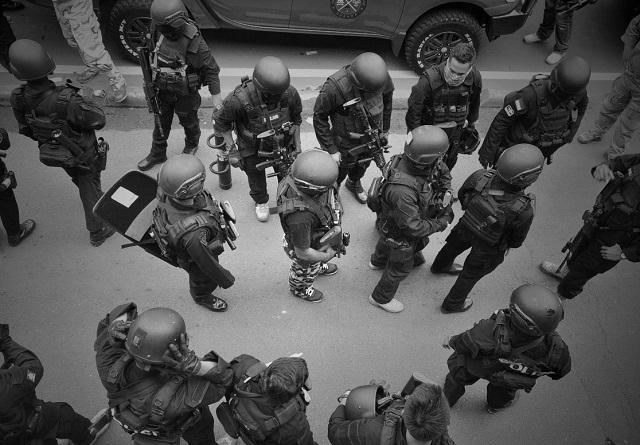The Jalan Thamrin incident—how should Australia respond?
Posted By Allan Behm on February 3, 2016 @ 06:00
Those of us who have enjoyed a long association with Indonesia would recall, with some affection at least, the former Australian Embassy in Jalan Thamrin. With the Selamat Datang (Welcome) monument opposite and the Hotel Indonesia nearby, the embassy was in the heart of Jakarta. Across the road and a few hundred metres north was the Sarinah department store, much loved and frequently visited by President Suharto’s wife, who is remembered with somewhat less affection as Ibu Ten Percent (Ibu Tien).
It was just down the street from Sarinah that the 14 January 2016 shootings and bomb attack took place. As John McBeth has suggested, [2] that incident may mark a tactical shift by Islamic State’s Indonesian affiliates away from high profile hotel and embassy targets to more accessible public places where death and destruction may be greater and even more indiscriminate.
The incident raises the question: how should Australia best respond?
Quite properly, Prime Minister Turnbull and Foreign Minister Bishop expressed both their condemnation of the terrorists and condolences for the death of members of the public who just happened to be there. Attorney-General Brandis offered closer intelligence and police cooperation, but without any detail as to what that might entail. The operational relationship between Indonesian and Australian intelligence and police agencies is already close, and short of additional effort by the ‘Five Eyes’ signals intelligence gatherers, it’s difficult to see what more could be done in the short term.
In circumstances such as this, governments generally look to the immediately available symbols of cooperation without examining deeper and more enduring forms of cooperation that focus on the causes of terrorism rather than its symptoms. For all the resilience of its social institutions—witness the Kami Tidak Takut (we are not afraid) Twitter response—Indonesia is a nation whose political, economic and administrative institutions are still evolving.
In contrast to President Hollande’s somewhat hyperbolic reaction to the December attacks in Paris—‘France is at war’—President Widodo’s response has been measured and reassuring. In this, his style is closer to that of President Obama and Prime Minister Turnbull than to the more apocalyptic tone adopted by Hollande and former Prime Minister Abbott. Jokowi spoke of actions [3] that ‘disrupt (mengganggu) public security and the peace of the people’. Instead of calling for sanctions, he called for calm. Instead of according them credibility and status by referring to the perpetrators as ‘Islamic terrorists’, he called them for what they were—common criminals.
In an interview with Foreign Affairs [4] shortly after becoming President, Jokowi said that ‘to deal with radicalism and extremism, we need to deal with economic inequality’. Just as Prime Minister Turnbull emphasises social inclusion as the key to addressing alienation among Muslim youths in Australia, so too does Jokowi talk about empowering the people.
That’s where Australia can help, in its own long-term interests as well as those of Indonesia.
A closer investment, business and trade relationship with Indonesia isn’t simply an economic imperative. It’s a strategic imperative. For the strategic fact is that continuous Indonesian economic growth and increased prosperity for its citizens plays into greater national security for Australia. The trade and investment fact, however, is that the economic relationship is an artefact of the bilateral political relationship.
Until there’s some real meat on the bones of the political relationship, perturbations such as the mobile phone interception crisis will generate retaliation in the trade relationship—witness the 2015 quotas on live cattle imports. That was an amazing ‘own goal’ that drove up domestic beef prices, thereby forcing a back down by the Indonesian government.
Building substance and complexity into the Australia–Indonesia relationship remains a work in progress. Australia generally overlooks Indonesia as we focus further north, and Indonesia hardly looks our way at all—two nations separated not only by the Arafura Sea but also by cultural ignorance and suspicion.
It’s in Australia’s longer term strategic and economic interests to build stronger and more permanent bridges between our political, legal, administrative and economic institutions, expanding our exports beyond agricultural products and education to a wider range of financial, investment and health services.
But for investment both to broaden and deepen, for example, Australian investors will demand greater transparency and reliability in Indonesia’s legal system. That’s one area in which Australia really can help, particularly in corporations law, taxation law, real property law, and a number of other essential components of modern investment practice.
It’s an extraordinary oversight on the part of the Australian parliament that it hasn’t forged strong institutional links with the parliament of an important and emerging democracy. While Australians may be blasé and dismissive with respect to political symbols, such symbols truly matter in Indonesia. Reciprocal exchanges between the presiding officers and the key parliamentary officials, for example, would be an inexpensive but powerful means of signaling Australia’s support for Indonesia’s democracy without involving party politics.
Australia needs quickly and publicly to get behind Jokowi’s measured approach to the Jalan Thamrin incident. If it’s important enough to discuss home grown terrorism with President Obama, it’s certainly important enough to conduct the same discussion with President Widodo.
Democracy is the best defence against terrorism.
Article printed from The Strategist: https://aspistrategist.ru
URL to article: /the-jalan-thamrin-incident-how-should-australia-respond/
URLs in this post:
[1] Image: https://aspistrategist.ru/wp-content/uploads/2016/02/23750985993_c31ebfedd3_o.jpg
[2] has suggested,: https://aspistrategist.ru/jakartas-terror-attacks-a-new-tactical-dimension/
[3] Jokowi spoke of actions: http://www.theatlantic.com/international/archive/2016/01/joko-widodo-indonesia-terrorism/424242/
[4] interview with Foreign Affairs: https://www.foreignaffairs.com/interviews/2014-10-20/opening-indonesia
Click here to print.
